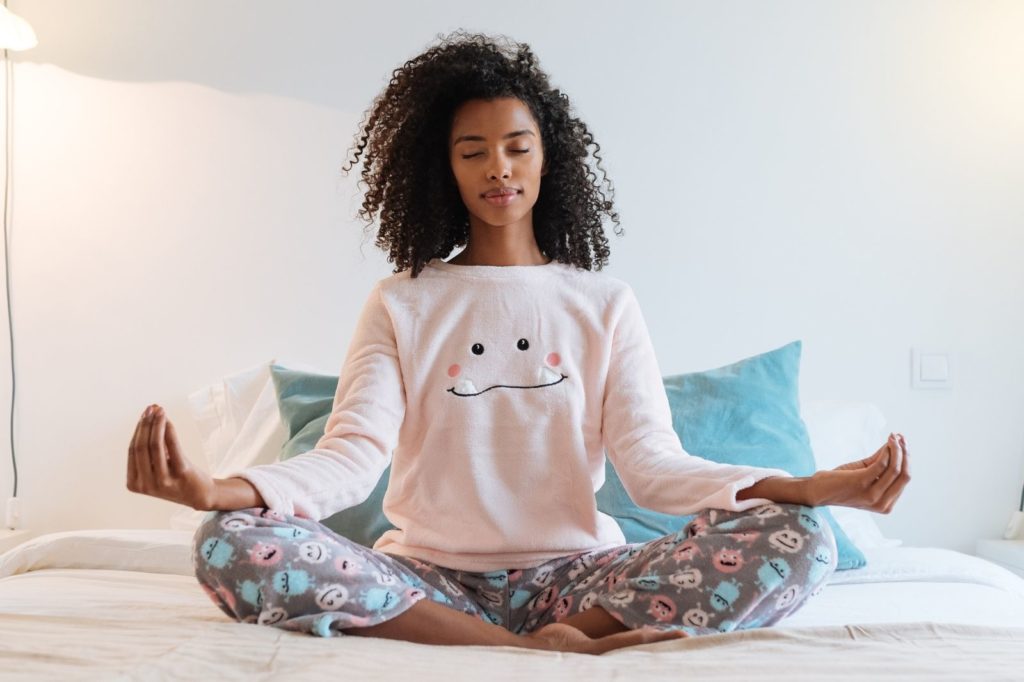You’ve had a stressful day at work, running errands, or taking care of the kids. The stress keeps building, and there doesn’t seem to be an end in sight. With all of this going on, how can you fit in self-care and manage the stress that comes from day-to-day life?
The solution might lie in mindfulness meditation.
Mindfulness meditation is the practice of intentionally noticing bodily sensations, thoughts, and emotions in a non-judgmental way in order to promote relaxation and to increase self-awareness. This specific form of meditation has been shown to decrease stress both mentally and physically, making it an ideal self-care strategy to use when life gets overwhelming.
For example, practicing mindfulness meditation has been shown to reduce blood pressure, increase focus and concentration, decrease cognitive decline, and decrease pain intensity. Other research found that this strategy can help with reducing rumination (the act of repeatedly dwelling on thoughts or events that exacerbate distress). Mindfulness meditation has also been found to help increase your ability to manage negative emotions and stress.
You Can Do Mindfulness Mediation in Just a Few Minutes
Not only are the benefits of practicing mindfulness meditation very helpful when it comes to managing stress, but learning mindfulness meditation doesn’t require highly specialized training or a month-long retreat in a far-off land. Instead, these strategies require anywhere from one minute to 45 minutes to practice and are fairly straightforward to learn, even without taking a specialized class. (However, it is important to clear any new exercise with your healthcare professional first.)
Some popular forms of mindfulness meditation include deep breathing, body scan, progressive muscle relaxation, and guided imagery.
Deep Breathing
Deep breathing is a specific way of breathing that directly combats the physical and mental symptoms of stress because it activates the parasympathetic nervous system, which acts like the “brakes” on your body’s stress response by slowing down your heart rate, relaxing muscles, and lowering your blood pressure. These all directly counteract what happens when you are experiencing stress: increased heart rate, increased blood pressure, muscle tension, shallow breathing, etc.
There are many deep-breathing exercises to choose from, such as belly breathing, morning breathing, and roll breathing, and it is a great strategy to use if you only have a minute or two to address your stress. There are also popular apps you can use to help guide your deep-breathing exercises, such as Prana Breath, Breath2Relax, and Breathing Zone.
Body Scan
Body-scan exercises are also helpful for addressing stress. It is a simple exercise in which you start at your head and move through your body down to your toes. During this exercise, you observe for signs of stress and then try to relax those tense muscles. This exercise can also be combined with deep breathing to decrease stress and increase relaxation.
Similar to deep-breathing exercises, this form of mindfulness meditation helps you improve your ability to not only notice your stress “pain points,” but also to promote relaxation and stress management.
Progressive Muscle Relaxation
Progressive muscle relaxation exercises are a modification of body-scan exercises in which, in addition to scanning your body for signs of stress, you gently tense and then relax each muscle group. This type of exercise has two benefits: It helps you recognize where you are holding stress in your muscles, and it helps you recognize what tension versus relaxation feels like.
This exercise is a great option to use when you have anywhere from 10 to 30 minutes and want an active strategy that is both mentally and physically engaging.
Guided Imagery
Finally, guided imagery is another form of mindfulness meditation that can be a helpful tool to address stress wherever you are. Guided imagery combines the use of your imagination and five senses to promote a state of relaxation and reduce stress. Whether you are imagining a very peaceful place, a happy memory, or your dream vacation, this exercise helps you to take a break from the stress of the moment to regroup and relax before tackling the rest of your day.
No matter what mindfulness meditation strategy you choose, make a commitment to practice it consistently and see what benefits you experience. You may find one that works better for you or is a better fit for your lifestyle. The most important thing is that you use strategies that are effective and efficient in helping you reduce stress so you can be the best parent you can be.










